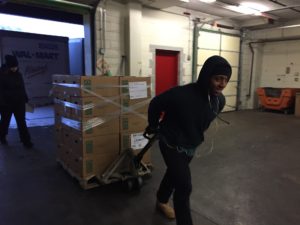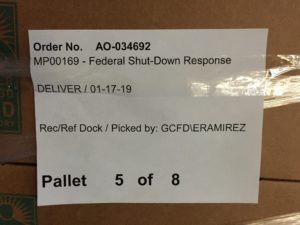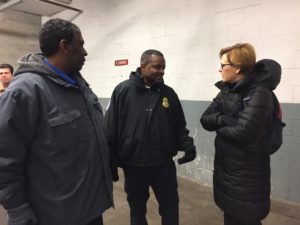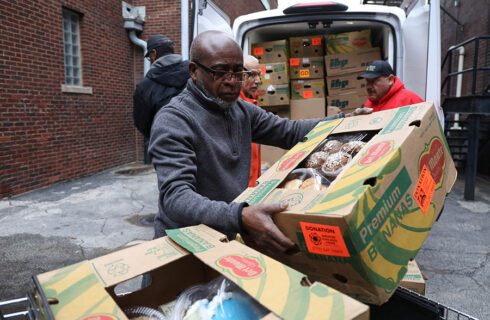The Greater Chicago Food Depository's response to federal shutdown included delivering more than 1,000 boxes of food to federal workers
On a recent morning before the sun was up, a Greater Chicago Food Depository truck backed up to a loading dock at offices for Transportation Security Administration workers at Midway International Airport. Food Depository staff and TSA workers then unloaded more than 200 boxes of food – rice, spaghetti, canned fruits and vegetables, and more – as well as fresh produce. It was just the beginning of a busy week in our response to the shutdown, which has already increased hunger in our communities.Our direct response

A Food Depository employee unloads a truck full of food for TSA workers at Midway airport.

For the first time in its 40-year history, the Food Depository delivered food directly to federal workers as a result of the shutdown.

Amy Laboy (right), the Food Depository's senior director of programs, poses with TSA workers, holding gift cards from Jewel-Osco.

Kate Maehr, executive director and CEO of the Greater Chicago Food Depository, talks to Darrell English (middle), a longtime TSA worker at Midway who helped organize the distribution.
Ongoing concerns for local families
Federal workers like English likely will receive back pay now that the shutdown is temporarily ended. But in many cases, the damage has been done and families have fallen deeper into debt. Significant concerns remain about SNAP funding, as well. If SNAP benefits, formerly known as food stamps, are funded through March, those receiving benefits would still be faced with an unusually long time between disbursements. Benefits for February were disbursed on or before January 20; March benefits likely wouldn’t be disbursed until the first week of March, as per usual.That so-called “SNAP gap” will cause financial strain and increased food insecurity for millions of American families.More than 4 million low-income households, including 8 million people, could experience a gap between benefits of more than 50 days, according to an analysis by the Center on Budget and Policy Priorities. The Food Depository will remain vigilant in monitoring the situation. But this much is clear: A federal government shutdown hurts working families and our most vulnerable neighbors. A shutdown increases food insecurity. It throws American lives into disarray. We call on the White House and Senate leaders to do better for the American people and keep the government open for good.
Share This Post



